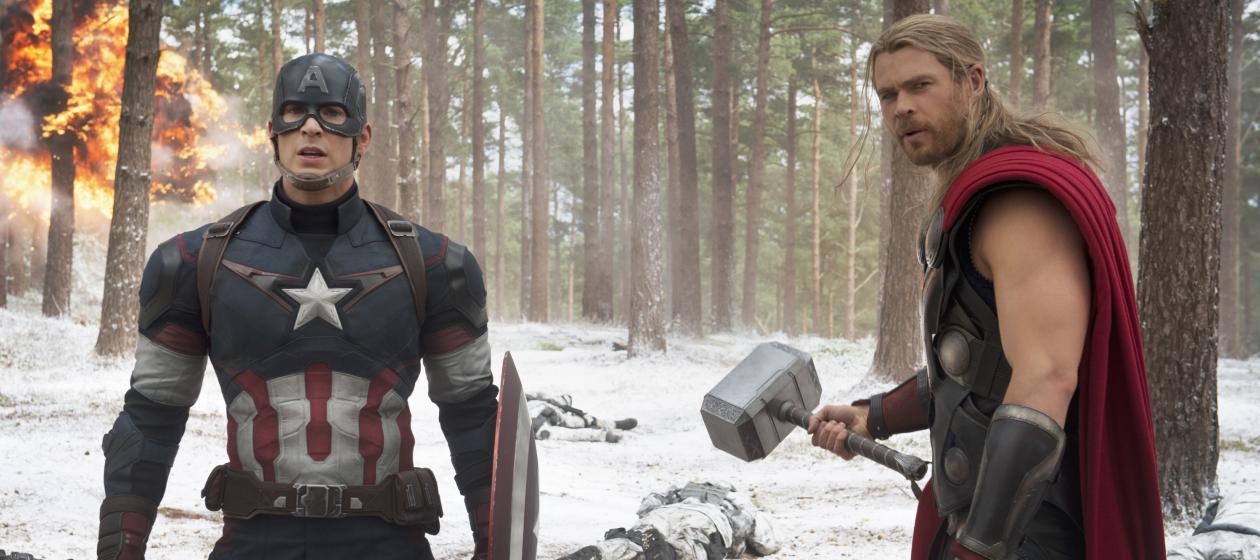On Friday, I kept my promise to take my little flock of sons to see the movie they’ve been waiting for all year, Avengers: Age of Ultron. I was expecting to have to explain some things, as I do with almost every movie, and I did. There were a few profanities. The villain had a messiah complex, complete with some cribbed lines from the actual Messiah. But what surprised me the most was the jarring centrality of the family in this film. And by family, I don’t mean the elastic, redefined concept of “families” but an undercurrent of pining for the stability of the natural, nuclear family.
Let me stop here and say “spoiler alert” for those of you who haven’t seen the film, but let me also say there’s nothing here that will spoil the film for you. In truth, the fact that what I’m about to talk about includes a “surprise” plot twist is exactly part of the point I’m making.
In the film, the superhero group find themselves tracked and targeted, with no place of refuge from a virtually omniscient (there’s that Messiah complex, again) Ultron. Until they find one spot on the map where they can’t be mapped. It’s Hawkeye’s house, out in a rural area. The surprise is that waiting for Hawkeye is his wife and children. The arrow-slinger didn’t tell his colleagues, or his superiors, about his family, in order to keep them protected from his dangerous life.
The idea of a family seems to be a shock to everyone. No one had ever considered it as a possibility. Earlier in the movie, when Hawkeye’s injury is repaired with regenerated skin (again, spoiler alert; sorry), the doctor says, “Not even your girlfriend can tell the difference.” In one of the most touching scenes in the film, Hawkeye’s wife runs her hand along his abdomen and says, “I can tell the difference.” This is no girlfriend. This is one-flesh, head and body, a wife and her husband.
Moreover, the house is a refuge. With all of the chaos going on in the world around them, this house, filled with running children and Lego parts scattered across the floor, is a place of calm. It is, as Christopher Lasch put it, “a haven in a heartless world.” Even Bruce Banner seems tranquil in this place (and we would know it immediately if he were stressed). Unlike Superman, this hero’s fortress is no place of solitude.
Hawkeye’s life as a husband and a father isn’t seen as something that detracts from his super-heroism. It is something presented as almost a luxury, something to be envied if not aspired to. Later in the film another character, Black Widow, reveals that she has been sterilized as part of her training. This is seen as a profound loss. Captain America looks at Hawkeye’s life and wonders if it’s a possibility that died for him when he was buried in the ice back during World War II.
It’s interesting to me that Hawkeye’s “traditional” family life is seen as countercultural, in the best sense of that word. For the past two or three generations, the heroes in popular culture were often trying to escape the stifling “conformity” of the nuclear family. In this movie, though, conformity seems to be girlfriends and boyfriends and, implicitly, sex and romance, but not marriage and family. A family of husband and wife with children, that is more surprising than artificially intelligent robots, suspended animation, or Gamma-radiated monsters.
Perhaps this is a signal of a bit of longing for something different. As I’ve said many times before, the Sexual Revolution can’t keep its promises. The breakdown of families doesn’t bring the liberation some think. Those of us who believe in the old ways need to nourish these habits and practices, not only in obedience to God and not only for our own flourishing, but for the sake of generations to come. Families, designed according to the pattern held together in Christ, will seem odd and strange and freakish, but sometimes odd and strange and freakish is exactly what people are looking for. In fact, love and marriage and family, sometimes even superheroes need what they never knew they wanted.
Photo credit: Jay Maidment/Disney/Marvel via AP







